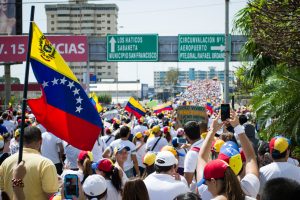
By: Samantha Cleare
In many parts of the world, Easter Sunday is a day for religious sanctity; however, Venezuelan protestors celebrate this holiday differently.
This Easter Sunday in Caracas, Venezuela, anti-government demonstrators demanding the “resurrection of democracy” used the once-religious ceremony, the burning of Judas, to stage a political protest. But in place of Judas, the Bible’s most infamous traitor, the protestors burned effigies of Venezuelan President Nicolas Maduro.
Recently, countries in Latin America and parts of Greece have participated in the “Burning of Judas.” Judas, on the other hand, has been replaced by political figures in order for protestors to express symbolic animosity towards the government. According to Time Magazine, in 2008, Venezuelan protestors replaced Judas with as an Exxon representative after the legal settlement between the nation and the oil company. Government supporters participate in the protest, as well.
In order to fight fire with fire, government supporters gathered and burned representations of the opposition’s leaders. One of these depictions included jailed opposition leader Leopoldo Lopez, whose group, the Voluntad Popular (Popular Will), planned the demonstration.
Other, more violent forms of protests also took place. Demonstrators threw Molotov cocktails and rocks, set tires on fire, and barricaded major roads in the capital city. In response, the police fired tear gas into the crowds.
Venezuelan students set up a United Nations (UN) office in Caracas in March to support the revolutionary movement. The crowd shouting for the “resurrection of democracy” marched to these UN tents. Protestors documented the event on social media through the hashtags #ProtestaSanta (Holy Protest) and #QuemaTuJudas (Burn Your Judas). The major Prados del Este highway in Caracas was shut down through Monday morning. This one day long riot injured four people.
A year ago on April 19, 2013, former bus driver and union leader Nicolás Maduro replaced the late president Hugo Chavez in office. Chavez “hand picked” Maduro, who took the presidential office promising to further his mentor’s socialist beliefs. Tired of a lack of change in the government, protestors were infuriated. In early February, protests erupted in Venezuela against Maduro and Venezuela’s leftist government.
Former Caracas mayor Antonio Ledezma and opposition legislator Maria Corina Machado support “The Exit,” a plan to kick Maduro out of his presidency. “The Exit” advocates utilizing protests, exhausting the government, until Maduro finally leaves office. As a result of this wave of violent demonstrations, 41 people have died, 600 have been injured, and 100 have been detained. According to Chacao’s mayor Ramon Muchacho, there were no bullet injuries on Sunday.
These current riots are descendant of those that began after the former Miss Venezuela and soap opera actress, Monica Spear, was slayed in January. The shocking death of Spear and her ex-husband while they were in the countryside with their daughter sparked outrage throughout the world. TV personality Camila Canabal tweeted, “Monica and Thomas are the face of thousands of men and woman whose children have been left without parents because of the violence of Venezuela.”
Due to Venezuela’s lack of media attention since Spear’s shocking death and video, this publicized riot on Sunday resurrected the world’s attention towards Venezuela. The country has the fifth-highest murder rate in the world, according to the United Nations. What is being done to end the violence? Why does the turmoil continue?
While President Nicolás Maduro speaks to Venezuela’s overall improvement, the country’s persisting violence and weak economy say otherwise. Calls for increasing economic opportunity, public safety, liberties, and basic necessities have not been answered. According to Venezuelan market manager Roger Escorihuela, “there are cereals, eggs, pastas, and fancy jams, but the staples that are subject to price controls—black beans, corn meal, the list goes on—are missing.” Venezuela’s global bond markets continue to receive poor ratings, corruption continues to consume state assets, and even basic goods are scarce. The country’s inflation rate of 57 percent has stayed the same, as well. As for the violence, according to Marco Rubio of the New York Times, Maduro has promised to strengthen cooperation between the community and the police by building a new national police force and improving the prison system. A new police force could improve the safety of Venezuelan citizens while the new prison system could fairly lock convicts behind bars. However, thugs still roam the streets searching for government employees to assault and murder; and, the prison system holds revolutionaries, including López, behind bars.
Prior to the Easter Sunday riots, President Nicolás Maduro agreed to hold talks with leaders of the coalition party in order to diffuse the tension. South American foreign ministers brokered the televised meeting, questioned and negotiated with both sides of the argument in order to avoid further conflict. The ministers’ main goal is bridging the political rift between the opposition’s and the government’s ideologies. Foreign ministers from Brazil, Columbia, and Ecuador, as well as the Vatican’s ambassador Arch Bishop Aldo Giordano, attended the event. Giordano read a letter from Pope Francis, which urged the two sides to find a peaceful agreement. While Maduro shook hands with the people he denounced after this meeting, Venezuela’s violence continues. He did not change his policies concerning Venezuela’s government, economy, or justice system.
The two radical sides cannot seem to find a common ground; the government’s often violent and negligent way of handling the situation does not answer the cries of the people. As the country lacks the ability to alleviate the violence, other countries including the United States consider entering the conflict. The Venezuela Defense of Human Rights and Civil Society Act of 2014 would impose targeted sanctions on persons responsible for violations of human rights of Venezuelan anti-government protesters. The purpose of this bill is to strengthen the country’s civil society. Congress now can either fall for Maduro’s charm or join the people of Venezuela in improving the country’s well being.

